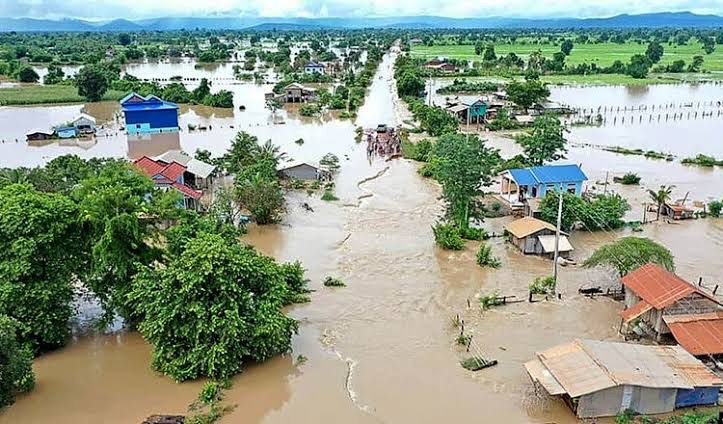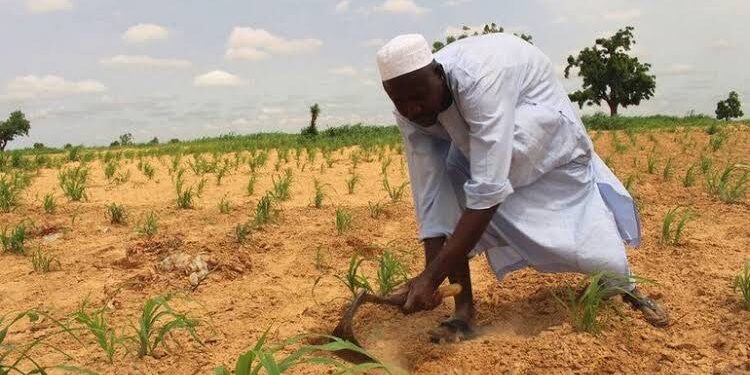The devastating floods that have submerged approximately 70 percent of Maiduguri, the capital of Borno State, present an alarming threat to Nigeria’s already strained food security situation, exacerbating the nation’s hunger crisis.
This flooding, which has severely impacted Nigeria’s northeast—a key agricultural hub—may lead to a significant decline in food production, further intensifying the country’s ongoing food challenges.
The floods, driven by heavy rainfall, have affected over a million farmers and residents across Nigeria’s northeastern region, where staple crops such as sorghum, tomatoes, rice, millet, and sesame are produced. This region is also a major player in the country’s livestock and cattle farming.

Borno State, in particular, which has been ravaged by years of insurgency, plays a critical role in growing essential crops like maize, yam, cassava, sorghum, cowpea, millet, sweet potato, and rice—much of which is transported to the southern parts of the country. The floods have disrupted not only the local economy but also the supply chain for food across Nigeria.
The situation in Borno is not isolated, as other critical agricultural states have also experienced severe flooding. States such as Ebonyi, Sokoto, Benue, Kano, Niger, Plateau, Kwara, and Jigawa—all of which contribute significantly to Nigeria’s food production—have seen extensive damage to farmlands and livestock.
For instance, in July 2024, floods in Sokoto displaced 1,664 people, devastating four communities in the state. In Benue, often referred to as Nigeria’s “food basket,” 1,000 houses and farms were destroyed by heavy flooding, while another round of flooding in August impacted more than 100 households.
Jigawa State has been particularly hard hit, with 14 local government areas submerged by floodwaters in mid-August, affecting 40,000 people and more than 80,000 households. Tragically, 28 people lost their lives as a result. Similarly, in Ebonyi State, September saw floods sweep through the Okpuitumo Community in Abakaliki Local Government Area, destroying numerous farmlands, which are vital for rice production.
Kano State, another critical agricultural zone, has experienced one of the worst impacts of flooding in 2024. The state’s Emergency Management Agency reported that between January and September, floods claimed the lives of 49 people and affected 226 communities across 27 local government areas. These floods have severely disrupted the state’s production of key crops such as rice, maize, wheat, and tomatoes, which are vital for both local consumption and national food supply.
Niger State, another major food-producing state, has struggled to rehabilitate 13,965 farmers affected by previous floods. However, in August 2024, new floodwaters hit the state, destroying over 89 houses. Niger State is known for producing fruits such as pineapples, bananas, mangoes, watermelons, and sugarcane, as well as soybeans—crops that are critical for both food security and economic stability in the region.
The flooding has far-reaching consequences beyond immediate displacement and property damage. The agricultural landscape of these states is deeply intertwined with Nigeria’s overall food security. For example, Ebonyi is known for its production of rice, cassava, and tomatoes, while Jigawa grows millet, sorghum, cowpea, groundnuts, sesame, rice, and maize.

Benue, often referred to as the country’s “food basket,” produces a wide variety of crops, including yams, rice, and oranges. Kwara contributes to national food production by growing crops such as yams, maize, sorghum, millet, onions, and beans.
Experts are raising alarms about the longer-term impact of these floods on Nigeria’s food supply. Aniemeka Okeowo, a flood risk consultant, warns that this is just the beginning of what could be a disastrous rainy season for Nigeria, with flooding expected to affect 31 states.
“Most of these states are critical food producers,” Okeowo noted, adding that the destruction of farmlands and crops will undoubtedly reduce food supply and further strain the country’s food security. “We need to act now before it’s too late,” she urged, highlighting the urgent need for preventive measures.
A report by SB Morgen (SBM) Intelligence, a Lagos-based data-driven research firm, highlights the broader implications of the flooding crisis not only in Nigeria but across the African continent. The report stresses that the long-term risks of these floods include a significant challenge to Nigeria’s food security, which is already under immense pressure due to violence, insecurity, poor storage facilities, and foreign exchange issues. The floods will only exacerbate the problem, creating a severe disruption in agricultural output.
Nigeria’s economic outlook is already fragile due to a confluence of issues, including elevated food and energy prices. While the country’s inflation rate dropped to a six-month low of 32.15 percent in August, down from 34.40 percent in July 2024, this slight improvement has done little to ease the financial burden faced by many Nigerians.
Food inflation, which accounts for over 50 percent of the country’s headline inflation, decelerated to 37.52 percent, largely due to seasonal harvests. However, despite these figures, the prices of essential food items like rice, beans, and bread remain stubbornly high, leaving many households struggling to afford basic staples.
According to a report from the Food and Agriculture Organization (FAO), Borno State—a region already plagued by insecurity—faces an especially dire situation. Food production in the state, including crops, livestock, and fishing, contributes to only 5.9 percent of the local population’s food needs.
The FAO report indicates that nearly 94 percent of the food consumed in Borno is imported or provided through international aid, particularly from NGOs, the World Food Program (WFP), and other civil society organizations.
The scale of the flooding’s impact on food security is further underscored by the findings from the Nigeria Impact of Flood, Recovery, and Mitigation Assessment Report, published in 2023.
The report revealed that 49 percent of households across the country reported a disruption in their main food source due to flooding, with rural households (60 percent) being hit harder than those in urban areas (23 percent). States like Bayelsa and Jigawa experienced the highest levels of disruption, with 87.2 percent of food sources affected, while Anambra reported the lowest impact at 18.4 percent.
The flooding of 2022 served as a grim precursor to the current crisis. That year, Nigeria experienced its worst flooding in decades, with over 600 fatalities and more than 3.2 million people affected across 34 of Nigeria’s 36 states, including the Federal Capital Territory.
While flooding is an annual occurrence in the country, the 2022 floods caused unprecedented damage and disruption, surpassing even the devastating floods of 2012, which displaced nearly three million families and destroyed homes and livelihoods.
In Borno, the current flooding crisis has been described as the worst in 30 years, primarily due to the Alau Dam’s failure to manage the overflow of water. This has resulted in the displacement of nearly half a million residents and the tragic death of 37 people. The floodwaters have also led to a jailbreak and the death of approximately 80 percent of the animals at the Sanda Kyarimi Park Zoo, further compounding the tragedy.
Despite repeated warnings, there has been little evidence of proactive measures to mitigate the damage caused by floods in Nigeria. As SBM Intel noted, “It has become a pattern: floods arrive, displace thousands, destroy homes and farmlands, and leave survivors vulnerable to disease and hunger. Then, the cycle repeats the following year.”
Breaking this cycle requires a fundamental shift in both policy and cultural attitudes towards flood management. SBM Intel emphasizes the importance of making flood risk management a national priority.
This includes the development of reliable early warning systems, the implementation of robust urban planning regulations, and ensuring that flood-prone areas are adequately equipped to handle excess water.
The research firm warns that without a concerted effort to focus on prevention rather than reaction, the devastating impacts of flooding will continue to plague Nigeria, threatening not only food security but the livelihoods and well-being of millions of its citizens.

































